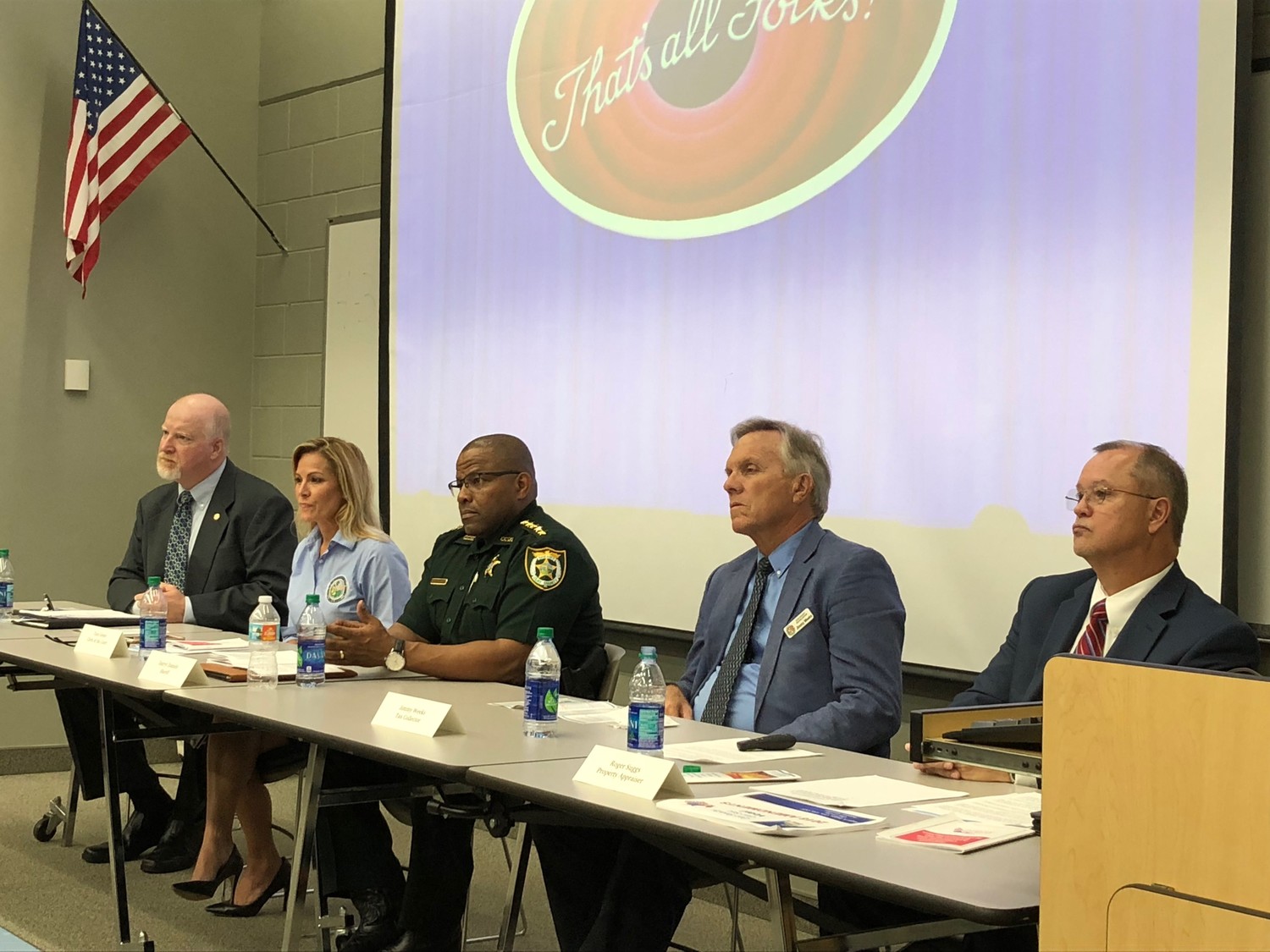Forum addresses state, local amendments
ORANGE PARK - Clay County’s five constitutional officers spoke to about 50 people at St. Johns River State College last week and addressed the 12 amendments on the Nov. 6 ballot.
Coming in with …
This item is available in full to subscribers.
Attention subscribers
To continue reading, you will need to either log in to your subscriber account, or purchase a new subscription.
If you are a current print subscriber, you can set up a free website account and connect your subscription to it by clicking here.
If you are a digital subscriber with an active, online-only subscription then you already have an account here. Just reset your password if you've not yet logged in to your account on this new site.
Otherwise, click here to view your options for subscribing.
Please log in to continueDon't have an ID?Print subscribersIf you're a print subscriber, but do not yet have an online account, click here to create one. Non-subscribersClick here to see your options for subscribing. Single day passYou also have the option of purchasing 24 hours of access, for $1.00. Click here to purchase a single day pass. |
Forum addresses state, local amendments
ORANGE PARK - Clay County’s five constitutional officers spoke to about 50 people at St. Johns River State College last week and addressed the 12 amendments on the Nov. 6 ballot.
Coming in with 56 percent undecided in statewide polls, Amendment 10 captured the most discussion. If approved, the amendment would make the positions of tax collector, sheriff, property appraiser, clerk of court and supervisor of elections elected. All five positions are currently elected offices, but that’s not the case for all Florida counties.
Clay County Clerk of Court Tara Green said the constitutional officers acted as checks and balances.
“So, [constitutional officers] are elected by the 155,000 registered voters vs. maybe five people on a county commission or a county manager or mayor,” Green addressed the audience. “[Amendment 10] ensures you guys the right to elect those individuals in these five positions.”
Property Appraiser Roger Suggs said since his office evaluates a property’s taxable value and the county sets the millage rate, it was critical the two processes were independent of each other.
“A vote yes on Amendment 10 guarantees your right as a registered voter to always be able to select your five constitutional officers in the future,” Suggs said. “It also guarantees those five constitutional officers will be able to administer their duties independently and without any influence of another government agency.”
Amendment 10 is a bundled amendment in that it also calls for creating a state counter-terrorism agency, requires the state Legislature begin its annual session in January instead of March on even-numbered election years and alters language securing the state’s Department of Veterans Affairs, essential changing wordage from “...the state may have VA,” to “Shall have a VA.”
“This new language will not only retain it, but it makes it a mandate,” Sheriff Darryl Daniels said.
Critics of Amendment 10, including the Florida League of Women Voters say as written, it would take power away from local government. Opponents also claimed the new VA and counterterrorism language are redundant and the Legislature’s change in a start date was meant for campaigning purposes.
Suggs noted two other bundled amendments – Amendment 6 and Amendment 9. Amendment 6 increases the retirement age of judges from 70 to 75 and includes “Marsy’s Law,” a victim’s rights provision. On the absurd side, Amendment 9 prohibits offshore oil and gas drilling and vaping in indoor workplaces.
“Obviously those are two similar things,” Suggs said to laughs from the audience.
The panel also addressed the county-specific amendments added by the county commission and charter review commission.
One amendment would set term limits on constitutional officers to three four-year terms, which wouldn’t take effect until 2032. Tax Collector Jimmy Weeks and Green said there was a wealth of knowledge in constitutional offices.
“We’re policy makers. We’re administers of the law, not ministers of the law,” Green said. “One other county in state of Florida I know of that implements term limits on constitutional officers, but the other 66 counties like the way it works.”
One amendment would increase commissioner salaries substantially based on an economic development review and population over four years. Another amendment would increase the county commissioner’s consecutive four-year terms from two to three, but permanently cap commissioners to three terms.
“[Currently] An individual could complete those two terms, take a term off and then come back and be re-elected,” Supervisor of Elections Chris Chambless said.
Student Brittany Lassiter, 24, asked the panel questions about lobbying in Tallahassee. She said the panel was excellent because she learned more about the amendments.
“I think this was a great opportunity to come out to honestly learn more on what we’re voting on,” Lassiter said. “You’ve seen through social media about what’s going, but that’s not what’s really going on.”
In the audience, Samuel Edwards, 22, raised concerns about Amendment 1. He said, through coursework at the college, he learned how much local governments rely on ad valorem taxes. Amendment 1 would raise the value of homestead property tax exemption to $100,000-$125,000 and increase the maximum exemption to $75,000.
Based on current assessed values, Suggs noted the county could lose about $6 million a year, while saving eligible homeowners about $200-$400.
“Learning that there’s going to be more exemptions, that going to be a lot less money they collect from ad valorem taxes,” Edwards said. “I don’t think people quite understand how important taxes are for the services we use.”








